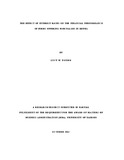| dc.description.abstract | Mortgage is a long-term commitment that ties a prospective homeowner down to mortgage repayment for at least 20 years or transfer of a legal or equitable interest in a specific immovable property for the payment of debt. Mortgage loans are secured by real the real property and provide a schedule of payments of interest and repayment of the principal to a bank. Following interest rates liberalization, interest rates have fluctuated to respond to changes in demand and supply of loan able funds in the financial market. However, this could be counter-productive or result in an unsound financial sector, in a country where financial institutions lack experience management. This study seeks to determine the effect of interest rates on financial performance of firms offering mortgages in Kenya.
The study adopted a survey research design on a target population of all organizations registered for mortgage lending as of 31st December 2011 which were 33. The study used secondary data sources to collect data from CMA library and Central Bank of Kenya. The data collected were analyzed using multiple linear regression analysis conducted at 95% confidence level.
The study established positive relationships in the five regression analysis between financial performance and the amount of mortgage loans advanced; three positive results were established between interest rates and the former. The study concludes that the amount of mortgage advanced by mortgage firms would lead to a high financial performance (EBIT) as it raises the revenue thereof. On the other hand, interest rate would positively relate with financial performance till it starts discouraging borrowings owing to increase in the cost of mortgage. The study recommends that mortgage firms in Kenya charge interest rates on the mortgage appropriately as ineffective interest rate policy raises the cost of mortgage borrowing, negate its demand thus lowers financial performance. | en |

